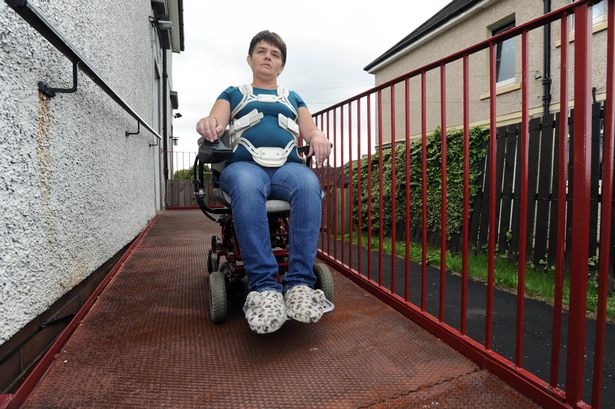
Alasdair MacLeod/Daily Record
By John Pring Disability News Service 22nd March 2018
The government has finally agreed to bring into force long-awaited laws that will impose a duty on landlords to allow disabled tenants to make access improvements to the hallways, staircases and entrances of residential properties.
The measures were part of Labour’s Equality Act 2010, which became law just before the 2010 general election, but successive Tory-led governments have refused to bring them into force.
Now the government has quietly announced that it plans to “commence” these provisions, with the commitment hidden on page 19 of its response to a report by the Commons women and equalities committee on disability and the built environment, even though the committee had made no mention of the issue in its report.
Despite the announcement, the government said it would still need to carry out “further work on identifying and assessing any additional burdens on local authorities” before it could say when the new laws would be implemented.
The lengthy delay has led to criticism from organisations including the Equality and Human Rights Commission, the Discrimination Law Association and Disability Rights UK.
The government was criticised for the delay almost exactly two years ago, in the report of a House of Lords committee that examined the impact of the Equality Act on disabled people.
The provisions are contained in section 36 and schedule four of the act and relate to the “common parts” of blocks of flats and other residential premises, such as entrances, hallways and stairs.
Once these parts of section 36 are implemented, those responsible for the common parts of a building will have to give permission for reasonable adjustments to be made – for instance the installation of a stairlift or a level entrance – if asked by a disabled tenant or leaseholder.
The landlord or owner of the freehold of the building will still be able to ask the disabled person to pay for the work.
The House of Lords committee said two years ago that it was “unconvinced” by government concerns about “cost and ‘red tape’, especially given that the cost of any adjustment would fall to the leaseholder or tenant and not the landlord”, and that there was “no justification for further delay”.
But it was told the government wanted a further review of the proposed laws.
Now the government has finally said that it “intends to commence Section 36, subject to Parliamentary passage of any regulations, should these prove necessary.
“Further work on identifying and assessing any additional burdens on local authorities is first required, after which an announcement on timing of the commencement will be made.”
A spokesman for the Ministry of Housing, Communities and Local Government said the government was “working towards a full commencement date” for section 36.
One leading disabled access consultant, Liam Proudlock, of Proudlock Associates, said he was pleased the government was finally intending to commence section 36, which he said should “improve disabled people’s ability to access and exit their homes and play an active role in their communities”.
He said: “This anomaly has previously been an area lacking in clarity and we are aware of a number of ongoing disputes (through our role as expert witness in the courts) that in the future this will (hopefully) resolve once and for all.”
Asked why it had taken so long to commence section 36, and what difference it would make to disabled people, a Government Equalities Office spokesman was unable to comment by 1pm today (Thursday).
